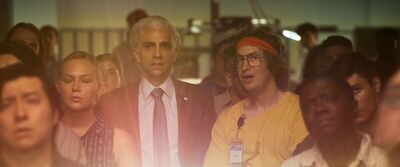
“BlackBerry” is a MoneyBro movie par excellence, right up there with “Wall Street,” “Glengarry Glen Ross,” “Boiler Room,” and “The Wolf of Wall Street.” It shares their key, defining trait: even though its main characters are either charismatic sociopaths or sheep, and the capitalist system they operate in is deeply corrupt and rewards men without morals or conscience, the story is so excitingly told, the performances so watchable, and the dialogue so quotable that it becomes the verbal equivalent of an action flick—kinetic, suspenseful, and sometimes unexpectedly beautiful and weirdly moving. Instead of shooting, stabbing, or beating each other, or chasing each other in vehicles, characters in MoneyBro cinema insult each other, construct elaborate traps that play on insider knowledge or exploit an opponent’s weaknesses and pathologies, score vindicating promotions and huge paydays, and try to see how long they can keep a streak going before someone slaps handcuffs on them. I’ve seen colleagues insist that “BlackBerry” should be shown in business school classes as a cautionary tale, but it’s easier to imagine a group of young guys in ties putting it on after a long night of carousing and reciting the dialogue together until they pass out. It’s one of the coolest portrayals of losers doomed to be historical footnotes that you’ll ever see, with a needle-drop soundtrack so cannily chosen that every song on it will probably be used in a commercial for a Fortune 500 company within the next two years.
Directed and co-starring Matt Johnson and inspired by Jacquie McNish and Sean Silcoff’s business history, Losing the Signal, “BlackBerry” is shot in a raggedy, trembling handheld style that suggests what an episode of “The Office” guest-scripted by David Mamet might have felt like. The most fascinating thing about the script, co-written by Johnson and Matthew Miller, is its structure. It shows us the beginning and end of this story but nothing else. The ellipsis in the middle gives the film a more intriguing energy than it would have had than if it had followed the standard playbook of meticulously tracking the rise and fall of a product and its purveyors. It’s what it might feel like to watch only the first and last episodes of an excellent TV drama that ran for years—or maybe like the MoneyBro equivalent of “Full Metal Jacket,” the only war film that shows naive recruits being trained/brainwashed at the beginning of the process and their cynical, hardened-by-war, final incarnations, but skips the middle part showing how the change happened.
The BlackBerry, of course, was the handheld device that the iPhone and its imitators wiped out of the marketplace. Part one of the movie shows how Mike Lazaridis (Jay Baruchel) and his partner Douglas Fregin (Johnson) created the BlackBerry and figured out how to let huge numbers of them operate on the same cellular network without crashing the system, then watched as its popularity spread, putting them on the verge of becoming tech icons in the mold of Steve Jobs.
Like many creative geniuses, Mike and Doug lack the ruthlessness and nuts-and-bolts knowledge they need to survive and thrive in a capitalist system. They’re nerds habitually bullied by their clients, including one who owes them millions for products they already shipped and has been stringing them along for months. Enter Jim Ballsillie (Glenn Howerton), a domineering executive and hockey buff who feels unappreciated at his current job. He senses that the duo is on the verge of something big and offers to make their problems disappear and grow the company if they make him CEO. Doug sizes Jim up as a “shark” and is justifiably terrified of him. But Mike, who stammers and cringes his way through any call asking for money, makes Jim “co-CEO” because he thinks there’s value in hiring someone who can strike fear in the heart of anyone who might try to take advantage of them and is bold enough to seize the initiative when it’s presented. “You know who’s afraid of sharks? Pirates,” Mike says.
The movie sprints through the company’s rise, compressing a lot of the story into lively montages shot in the style of a Steven Soderbergh heist film (or business procedural like his “High Flying Bird” or “The Informant!”), often leaning into the innate ridiculousness of a scenario—or the ridiculousness of somebody taking a supervisor’s instructions too far. (When Jim orders everyone at the company to become “male models” and be seen in public using BlackBerries no matter what activity they’re engaged in, the film cuts to a man playing tennis one-handed while using his free hand to hold a device.) There’s suspense that centers on whether the exponential increase in BlackBerry sales will overload their wireless carrier’s system and render their product unusable; the solution is ingenious.
There’s an implied breakpoint around the middle of the movie, and then we pick up in the mid-aughts when BlackBerry is about to get memory-holed by the same era that it did so much to define. This all plays out in a way that evokes Heraclitus’s belief that character is destiny. There are no surprises, really, in how everything goes. All the key players in the story behave more or less as they behaved when we met them, but the circumstances are different, and they’ve gotten complacent and myopic and are reluctant to bend and change.
The most fascinating thing about “BlackBerry” is how it pays close attention to the details of what happened and explains important moments without being too pedantic. At the same time, it treats the characters and events as elements in an art object. It’s fun to re-watch and study in hopes of noticing subtle details that escaped one’s attention the first time and draw connections between the halves. In one of Mike’s earliest personality-defining scenes, he puts his foot down when Jim tries to push him into throwing together a prototype in less time than he thinks he needs to do it properly. Later in the film, he gives in, with terrible results. Similarly, the macho, improvisational, blustery, “If I can dream it, I can make it happen” energy that Jim brings to the company’s early success blows up in his face later, like an exploding prop cigar. Even his fascination with hockey becomes an element in the company’s fall.
It might be instructive to superimpose the first and second parts of the film over each other to see if certain scenes map perfectly over other scenes. I suspect it would all fit as snugly as the key setpieces in the first and second “Star Wars” trilogies, which are also about how the seeds of a person’s triumph or downfall were planted early in the story of their life. Indeed, many of this film’s adults seem like overgrown children more often than not. Mike, especially—there’s a hint near the end that he loves the click-click sound made by the BlackBerry’s buttons so much that when the innovation of the screen-only iPhone threatens to eradicate the product, his brain has a brown-out and is malfunctioning when it comes back online. All he can do is deny the obvious.
Baruchel rose to fame playing a smart, sensitive, easily flustered teenager on TV’s “Ubdeclared”—what a deep bench of important storytellers and the Judd Apatow/Paul Feig factory produced!—and he channels some of that performance here, too, even though he’s 41 now and has dyed his hair silver to match the real person’s appearance. He and Johnson are completely believable as men who have known each other a long time but have only limited influence over each other’s major decisions, especially the bad ones.
Howerton assures himself a spot on any future list of classic scene-stealing jerks: with his shaved-bald head, narrowed eyes, and pouty lips, he’s the greatest supporting character that the young Bruce Willis never got to play. All three actors capture a quality that defined the ‘90s and aughts in both technology and finance—a self-flattering need to affect some “warrior spirit” and revel in the spectacle of destroying one’s enemies financially and virtually as if a village had been sacked and burned rather than a signature added to a document. As in satires like “American Psycho,” the behavior is appalling but funny enough to allow the scenes to circle back around the perception bend and become entertaining again. This movie is about people whose successes and failures originate in the same places: a tragedy shot and edited like an action comedy.
In theaters now.




